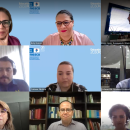UNESCO adopts the first United Nations international treaty on higher education

UNESCO / On 25 November 2019, UNESCO’s Member States adopted the first United Nations convention on higher education when the plenary of the 40th session of the General Conference endorsed the Global Convention on Recognition of Qualifications concerning Higher Education. The new convention establishes universal principles for recognition of studies and degrees, and will improve mobility for the more than 220 million students enrolled in higher education worldwide.
Eight years in the making, the new Global Convention expands the scope of the main principles of UNESCO’s regional recognition conventions to assess foreign qualifications in a fair, non-discriminatory and transparent manner. It builds on quality assurance mechanisms and sharing of information about higher education institutions and systems, study programmes and degrees. Where the regional conventions only cover mobility between countries within the different UNESCO regions, the Global Convention paves the way for the increasing mobility between regions and continents, which already counts for more than half of the 5 million mobile students in the world today.
Improved rights for students and qualifications holders
Although the Global Convention does not impose automatic recognition of foreign qualifications, it lays down the principle that a student qualifying for access to higher education in one country generally will qualify for higher education studies when moving to another country, unless there are substantial differences between access requirements in the two countries.
The Global Convention also simplifies recognition processes by turning the burden of proof from applicants to recognition authorities. Where in the past it has been largely up to students to prove why their foreign qualifications should be recognized, it is now up to recognition authorities to prove why qualifications should not be recognized, if recognition is not granted. Even when recognition is withheld, applicants have the right to appeal.
Furthermore, the general rule is now for recognition authorities to look for similarities with the objective of recognizing foreign qualifications, rather than rejecting recognition based on insignificant dissimilarities between foreign and national qualifications, as has often been the case before.
Facilitating recognition of online learning and refugees’ qualifications
The Global Convention includes innovative provisions on recognition of prior learning, partial studies, cross-border education and non-traditional learning modes such as online or blended learning. With the Global Convention, the obligation to fairly assess the qualifications of refugees who cannot provide sufficient documentation becomes a universal principle. UNESCO is therefore piloting the UNESCO Qualifications Passport for Refugees and Vulnerable Migrants to provide Member States with a tool for assessing undocumented qualifications held by refugees.
During the General Conference, four new states also ratified the regional recognition convention for Africa, the 2014 Addis Convention. Reaching a total of 13 ratifications, the requirement of 10 ratifications for entry into force is now met, and the Addis Convention becomes binding for its 13 states parties on 15 December this year. Twenty ratifications are needed before the Global Convention enters into force, and several Member States expressing their support for the convention have announced their intentions to imminently ratify the Global Convention.
A milestone on the right to education and the access to higher education
The new Convention creates a normative platform for fostering trust among higher education systems. It is a landmark opportunity for the world’s academic communities to embrace a common good and a common resolve to forge lifelong higher education learning institutions that are at once relevant, dynamic and inclusive. The Convention will help ensure the right to education of individuals by facilitating the access to higher education.
Learn more about the Global Convention on the Recognition of Higher Education Qualifications
Access the original publication on https://en.unesco.org
RELATED ITEMS








